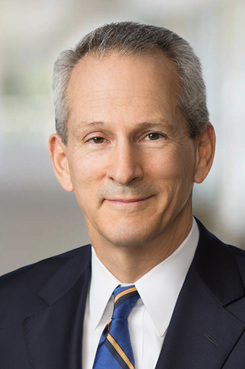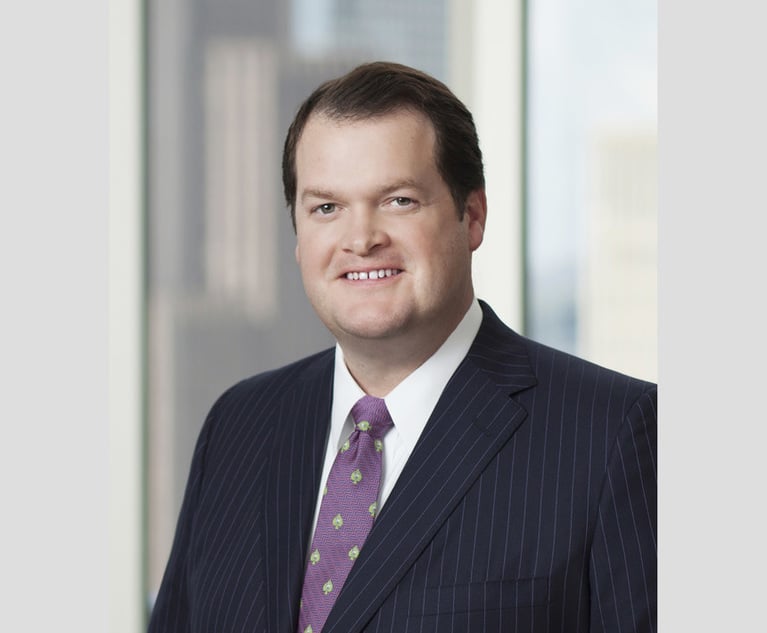These Texas Lawyers Are Giving Away Millions of Dollars
Pro bono lawyers and firms already donate their time to their clients, but some take gifting to the next level by winning attorney fee awards and donating the fees to charity. For example, in Texas, two firms plan to gift $6 million in attorney fees to launch programs for foster children.
December 23, 2019 at 11:38 AM
5 minute read
 Photo: Oleksandr Lytvynenko/Shutterstock.com
Photo: Oleksandr Lytvynenko/Shutterstock.com
It's the season of giving.
Rather than wrapping a new pair of slippers for the Christmas tree, there's a $6 million donation planned by two Texas law firms whose pro bono case declared the Texas foster care system unconstitutional.
Houston-based litigation boutique Yetter Coleman and Big Law firm Haynes and Boone want to gift their fees—$4.68 million and $1.53 million, respectively—to launch new programs for Texas foster care children.
"This case, for us, for my firm, has been a labor of love from the beginning," said Yetter Coleman managing partner Paul Yetter. "We are just on the cusp of major reform, and this has always been about the children. We thought the best use of the fee for our work would be for these children."
The donation plan is part of a total $20.81 million attorney fee award sought by a class of foster kids, who won rulings that said the Texas foster care system is unconstitutional and laid out recommendations to improve the system. The state is opposing the fees as exorbitant, and the U.S. District Court for the Southern District of Texas in Corpus Christi is expected to decide the dispute in the new year.
 Paul Yetter. Courtesy photo
Paul Yetter. Courtesy photoAlthough this is the first time that Yetter's law firm has won attorney fees in a pro bono case and chosen to donate the fees to charity, the practice is somewhat common in the nonprofit law firm world. Fee donations can go a long way to meet nonprofit firms' missions.
Jim Harrington, former director of the Texas Civil Rights Project, said that the nonprofit firm's pro bono counsel almost always donated their attorney fees to the group. The donated fees could range from $5,000 to tens of thousands of dollars. Those donations made up 10% of the nonprofit's general operating budget, he said.
"It was very important for us," Harrington said. "What it did was actually allow us to expand our services and provide more services around the state."
In June, Pillsbury Winthrop Shaw and Pittman donated about $1.5 million in attorney fees to the nonprofit firm Disability Rights Legal Center, said firm spokesman Erik Cummins in an email. Pillsbury retired partner Christine Scheuneman of Los Angeles, who didn't return a call or email seeking comment, was the lead pro bono lawyer for the center in a case by disabled students who were physically injured at school. Staff physically restrained them or pushed and slapped them. In a 2018 settlement, the Pomona Unified School District in Los Angeles agreed to implement extensive remedial actions.
Pillsbury's fee donation was a huge deal for Disability Rights Legal Center, said Elizabeth Eubanks, the center's formal regional director.
"The real effect of this lawsuit is going to be felt over a lifetime of students," she said. "Not only did they make this commitment by assigning staff to the case. Not only did they make the commitment to providing funding for the costs, up front. But donating the fees back is particularly exceptional."
In the Texas case, Yetter Coleman and Haynes and Boone worked with New York-based nonprofits Children's Rights and A Better Childhood, which work around the nation to better the lives of foster children. Children's Rights has won social impact litigation for foster children in Connecticut, Georgia, New Jersey, Washington, D.C. and other states.
Rather than donating the $6 million fee to those New York nonprofits, though, Yetter said he wanted the fees to focus on Texas foster children.
"We thought it could make a big difference in the lives of these children," he explained.
Haynes and Boone senior counsel Barry McNeil said major law firms have a responsibility to represent the disadvantaged.
"From the very outset my firm never thought that we would be undertaking this for any financial benefit," said McNeil. "We never thought that we would accept any attorney fees if we were so lucky to win."
Yetter noted that the two court-appointed monitors in the case are child welfare experts, and he looks forward to their recommendations and guidance on how to spend the $6 million donation. He expects to be able to fund more than one program, he said.
"One example is a program for older foster children who are about to age out of the system, and help them transition into a world that, at the moment, they are ill-prepared to go into," Yetter said.
Related story:
This content has been archived. It is available through our partners, LexisNexis® and Bloomberg Law.
To view this content, please continue to their sites.
Not a Lexis Subscriber?
Subscribe Now
Not a Bloomberg Law Subscriber?
Subscribe Now
NOT FOR REPRINT
© 2025 ALM Global, LLC, All Rights Reserved. Request academic re-use from www.copyright.com. All other uses, submit a request to [email protected]. For more information visit Asset & Logo Licensing.
You Might Like
View All
Energy Lawyers Field Client Questions as Trump Issues Executive Orders on Industry Funding, Oversight
6 minute read
Holland & Knight Hires Former Davis Wright Tremaine Managing Partner in Seattle
3 minute read
Kirkland Is Entering a New Market. Will Its Rates Get a Warm Welcome?
5 minute read
Law Firms Mentioned
Trending Stories
- 1We the People?
- 2New York-Based Skadden Team Joins White & Case Group in Mexico City for Citigroup Demerger
- 3No Two Wildfires Alike: Lawyers Take Different Legal Strategies in California
- 4Poop-Themed Dog Toy OK as Parody, but Still Tarnished Jack Daniel’s Brand, Court Says
- 5Meet the New President of NY's Association of Trial Court Jurists
Who Got The Work
J. Brugh Lower of Gibbons has entered an appearance for industrial equipment supplier Devco Corporation in a pending trademark infringement lawsuit. The suit, accusing the defendant of selling knock-off Graco products, was filed Dec. 18 in New Jersey District Court by Rivkin Radler on behalf of Graco Inc. and Graco Minnesota. The case, assigned to U.S. District Judge Zahid N. Quraishi, is 3:24-cv-11294, Graco Inc. et al v. Devco Corporation.
Who Got The Work
Rebecca Maller-Stein and Kent A. Yalowitz of Arnold & Porter Kaye Scholer have entered their appearances for Hanaco Venture Capital and its executives, Lior Prosor and David Frankel, in a pending securities lawsuit. The action, filed on Dec. 24 in New York Southern District Court by Zell, Aron & Co. on behalf of Goldeneye Advisors, accuses the defendants of negligently and fraudulently managing the plaintiff's $1 million investment. The case, assigned to U.S. District Judge Vernon S. Broderick, is 1:24-cv-09918, Goldeneye Advisors, LLC v. Hanaco Venture Capital, Ltd. et al.
Who Got The Work
Attorneys from A&O Shearman has stepped in as defense counsel for Toronto-Dominion Bank and other defendants in a pending securities class action. The suit, filed Dec. 11 in New York Southern District Court by Bleichmar Fonti & Auld, accuses the defendants of concealing the bank's 'pervasive' deficiencies in regards to its compliance with the Bank Secrecy Act and the quality of its anti-money laundering controls. The case, assigned to U.S. District Judge Arun Subramanian, is 1:24-cv-09445, Gonzalez v. The Toronto-Dominion Bank et al.
Who Got The Work
Crown Castle International, a Pennsylvania company providing shared communications infrastructure, has turned to Luke D. Wolf of Gordon Rees Scully Mansukhani to fend off a pending breach-of-contract lawsuit. The court action, filed Nov. 25 in Michigan Eastern District Court by Hooper Hathaway PC on behalf of The Town Residences LLC, accuses Crown Castle of failing to transfer approximately $30,000 in utility payments from T-Mobile in breach of a roof-top lease and assignment agreement. The case, assigned to U.S. District Judge Susan K. Declercq, is 2:24-cv-13131, The Town Residences LLC v. T-Mobile US, Inc. et al.
Who Got The Work
Wilfred P. Coronato and Daniel M. Schwartz of McCarter & English have stepped in as defense counsel to Electrolux Home Products Inc. in a pending product liability lawsuit. The court action, filed Nov. 26 in New York Eastern District Court by Poulos Lopiccolo PC and Nagel Rice LLP on behalf of David Stern, alleges that the defendant's refrigerators’ drawers and shelving repeatedly break and fall apart within months after purchase. The case, assigned to U.S. District Judge Joan M. Azrack, is 2:24-cv-08204, Stern v. Electrolux Home Products, Inc.
Featured Firms
Law Offices of Gary Martin Hays & Associates, P.C.
(470) 294-1674
Law Offices of Mark E. Salomone
(857) 444-6468
Smith & Hassler
(713) 739-1250






